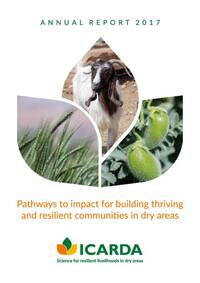ICARDA Annual Report 2017: Pathways to impact for building thriving and resilient communities in dry areas

Authors:
Widespread heat waves, floods, and droughts last year were a strong reminder of the threats posed by climate change. In the non-tropical dry areas where ICARDA works we are becoming accustomed to record high temperatures and increasing water scarcity year on year. Resilience and climate change adaptation are at the heart of ICARDA’s new Strategic Plan 2017-2026 – a bold and ambitious effort to harness cutting-edge science and deliver the tools and technologies that smallholder farmers need to maintain agricultural production and protect their livelihoods. Launched in the year when ICARDA celebrated its 40th anniversary, the new Strategic Plan builds on four decades of past achievements and successful partnerships. It is also demand driven and targets critical components of sustainable dryland food production systems. Innovation, adaptation, and resilience are critical to the long-term viability of productive agriculture in dry areas. The bold and ambitious ideas driving our new strategic direction reflect this – and help us to learn from past experiences, anticipate future challenges, and deliver the tools that farmers and rural communities need to thrive.
